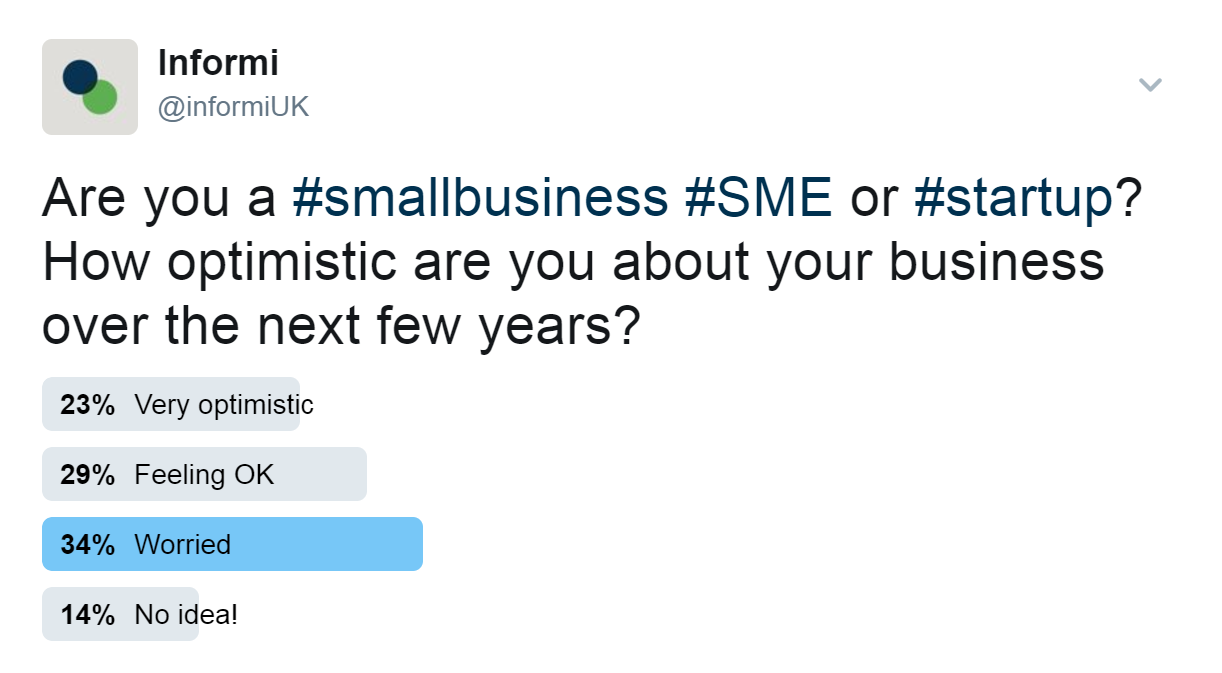60 years ago the British Prime Minister Harold Macmillan declared Britons had never had it so good.
In 2017, when we asked small business owners if they shared a similar optimism about their prospects, we got a very different response.

What are the reasons for the pessimistic outlook?
Well, Brexit hasn’t helped. As we woke to the game-changing referendum results on 24 June 2016, it was very clear that the 52% had voted for something most un-British. Stability and continuity, hallmarks of British life, were rejected in favour of upheaval and uncertainty.
Whatever your views, generally, instability does not lend well to business. One look at the stock markets will tell you this. The widely held narrative is that the next few years will be a bumpy ride.
While no one’s truly sure what’s around the corner, nightmarish talk of trade tariffs, price rises and labour shortages paint a gloomy outlook. With all that going on, amidst our third trip to the ballot box in as many years, it’s easy to see why businesses aren’t hedging their bets on an easy few years.
But, running a business is never easy and Brexit doesn’t change this.
Small business owners will still face the challenges they’ve always faced – challenges that are largely local and personal in their nature – rather than the global, geopolitical ramifications of Brexit. Are the EU negotiations really keeping the average small business owner awake at night? No…
These are the questions that keep SMEs awake at night.
Four in five MPs (79%) believe that people thinking about starting a new business, and even those who have been operating a business for a number of years, need more information advice and guidance – with exactly these types of questions.
The internet has changed everything
Sites like Informi are helping to fill that skills and knowledge gap.
Today, small business owners have access to a world of free information, available online. This empowers them to make better decisions and, importantly, feel more confident about being their own boss.
Need to write a business continuity plan? Download a ready-made template.
Need funding? Put together a Kickstarter campaign.
Need to find new suppliers? Network on social media.
Want to spread the word of your business? Set up a Google AdWords campaign. Create an Instagram business account.
You can, in theory, run a business without moving from your computer screen. Technology has empowered business owners with a wealth of low-cost, easy-to-use tools, while the internet has levelled the playing field.
Access to support, funding and influence, is no longer the preserve of a small few. Anyone can set up a website, grow their users, extend their influence and grow their brand.

Earlier in the year, we published a blog with Bettie Confetti, a small business owner who’d left behind her day job to focus on her e-commerce business – all run from home. Years ago this type of business would not have been possible.
Where once the process of launching a business was expensive and risk-laden, marketplace websites like Etsy provide an accessible and cost-effective entry point into business. It all feels very egalitarian. Marketplace websites reward the quality of your listing, product and service – meaning anyone can be a success.
Indeed, this is one of the great opportunities that the internet presents to small business owners. And also the challenge for those who do not embrace it: customer centricity is more important than ever before.
Just look at the big-name companies Blockbuster or the black cab taxis who are being disrupted by this new digital order. If you are savvy, have a good product, a good message and service, you can outflank the big players. If you overlook it, you lose customers, you go out of business.
Away from e-commerce
Clearly, technology and the internet have shaken up everything. But, as was demonstrated by the furore around business rates, bricks and mortar will always have a role to play in business.
Newsagents, hairdressers, shops, butchers, restaurants, bars, cafes and takeaways are all still very much part of our daily lives.
The success of these businesses can come down to many things but their location is an important factor, especially in a country of contrasting fortunes.
Our best cities to start a business research looked at a number of factors in cities around the UK, including SME density, rent and local infrastructure. As you can see the South of England is well represented but you may be surprised to see London languishing in 8th place.
Whilst London has the highest number of start-ups and a solid infrastructure, it also has the highest fail rate – perhaps due to the towering rent costs and business rates.
Indeed, while the recent business rates re-evaluation benefitted some parts of the country, London and the South East-based businesses have seen punishing rate increases, threatening their very existence. This poses a fundamental question about the High Street, put forward in this quote from author Jeanette Winterson on Channel 4 News.
“Do we want corner shops?” Do we want bookshops? Do we want dry cleaners? Do we want somewhere you can get a pint of milk? If the answer is yes… we have to look at how this becomes affordable.”
A new way of working?
But that shouldn’t put you off starting a business. In the last few years, there’s been a significant shift towards a new way of working.
“There are many, many more small businesses than there were in the Eighties, but our cities and our buildings just haven’t evolved to keep pace with that,” Rohan Silva, founder of Second Home, explained to the London Evening Standard in 2014.
He and others like him have made it their mission to change this. Co-working spaces worldwide have tripled in the last five years with companies such as Second Home and Central Working offering a cheap base for startups, freelancers and small businesses to set up and operate from.

It’s not just that it’s cheaper. For some, co-working represents a kind of working utopia; an exciting, dynamic environment that breaks down traditional workspace conventions. Everything is transparent so companies can see what one another are doing. This openness creates a culture of collaboration and enhanced creativity.










